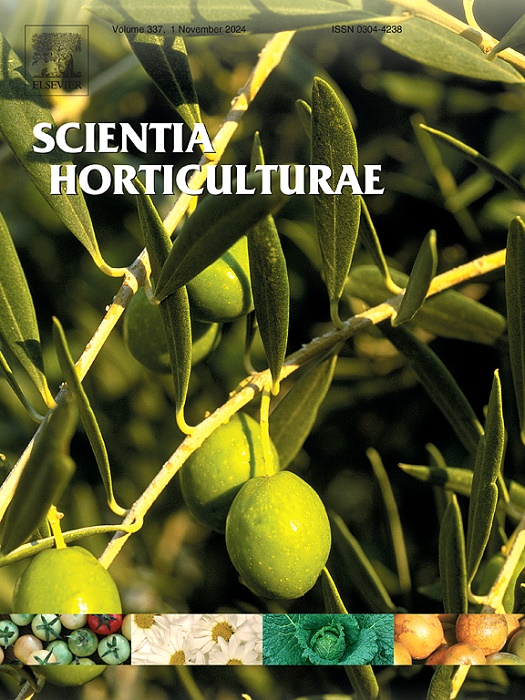Enhancing antioxidant capacity and regulating aquaporin genes expression for better water absorption by nano-silicon
IF 4.2
2区 农林科学
Q1 HORTICULTURE
引用次数: 0
Abstract
To clarify the mitigation mechanism of silicon nanoparticles (SiNPs) on Jerusalem artichoke (Helianthus tuberosus L.) under drought stress, we used the 'Qingyu' variety of Jerusalem artichoke as the research material. We conducted a greenhouse pot experiment to explore the effects of foliar spraying with a 100 mg·L⁻¹ nano-silicon (SiNP100) solution on the growth and physiological processes of Jerusalem artichoke seedlings subjected to drought stress, with the soil's relative water holding capacity controlled between 40 % and 45 %. The results indicated that, compared to drought stress alone, the application of SiNP100 (DS+SiNP100) significantly alleviated the growth inhibition of Jerusalem artichoke, while enhancing photosynthesis, chlorophyll fluorescence, and chlorophyll content in the leaf. Additionally, the levels of malondialdehyde (MDA), hydrogen peroxide (H₂O₂), and superoxide radicals (O₂∙⁻) were reduced. Conversely, the activities of superoxide dismutase (SOD), peroxidase (POD), and catalase (CAT), were markedly increased. Under the DS+SiNP100 treatment, the bound water content, total water content, and relative water content increased by 44.29 %, 12.09 %, and 5.42 %, respectively. In addition, the DS+SiNP100 treatment mitigated the increase of TIP1–5 and TIP2–2 induced by drought stress at 35 days, and improved the drought stress-induced inhibition of the expression levels of PIP2–7 and TIP2–7 genes. This may be attributed to the enhanced water status of the plants due to the DS+SiNP100 treatment. It is speculated that the AQP gene may play a role in regulating plant water status in response to SiNP100. In summary, foliar spraying of SiNPs significantly improves the drought resistance of Jerusalem artichokes. This study offers a theoretical foundation for utilizing SiNPs in the drought-resistant cultivation of Jerusalem artichokes.
提高纳米硅的抗氧化能力,调控水通道蛋白基因表达,提高纳米硅的吸水性能
为了明确硅纳米颗粒(SiNPs)对菊芋(Helianthus tuberosus L.)干旱胁迫下的缓解机制,我们以“青玉”菊芋品种为研究材料。通过温室盆栽试验,探讨了在土壤相对持水量控制在40% ~ 45%的条件下,叶面喷施100 mg·L - 1纳米硅(SiNP100)溶液对干旱胁迫下菊芋幼苗生长和生理过程的影响。结果表明,与单独干旱胁迫相比,施用SiNP100 (DS+SiNP100)显著缓解了菊蓟的生长抑制,同时提高了叶片的光合作用、叶绿素荧光和叶绿素含量。此外,丙二醛(MDA),过氧化氢(H₂O₂)和超氧自由基(O₂∙毒血症)的水平也有所降低。相反,超氧化物歧化酶(SOD)、过氧化物酶(POD)和过氧化氢酶(CAT)活性显著升高。在DS+SiNP100处理下,结合水含量、总含水量和相对含水量分别提高了44.29%、12.09%和5.42%。此外,DS+SiNP100处理在35 d时减轻了干旱胁迫诱导的TIP1-5和TIP2-2的增加,并改善了干旱胁迫诱导的PIP2-7和TIP2-7基因表达水平的抑制。这可能是由于DS+SiNP100处理提高了植物的水分状况。推测AQP基因可能响应SiNP100调控植物水分状态。综上所述,叶面喷施SiNPs显著提高了菊苣的抗旱性。本研究为在耶路撒冷洋蓟抗旱栽培中利用SiNPs提供了理论基础。
本文章由计算机程序翻译,如有差异,请以英文原文为准。
求助全文
约1分钟内获得全文
求助全文
来源期刊

Scientia Horticulturae
农林科学-园艺
CiteScore
8.60
自引率
4.70%
发文量
796
审稿时长
47 days
期刊介绍:
Scientia Horticulturae is an international journal publishing research related to horticultural crops. Articles in the journal deal with open or protected production of vegetables, fruits, edible fungi and ornamentals under temperate, subtropical and tropical conditions. Papers in related areas (biochemistry, micropropagation, soil science, plant breeding, plant physiology, phytopathology, etc.) are considered, if they contain information of direct significance to horticulture. Papers on the technical aspects of horticulture (engineering, crop processing, storage, transport etc.) are accepted for publication only if they relate directly to the living product. In the case of plantation crops, those yielding a product that may be used fresh (e.g. tropical vegetables, citrus, bananas, and other fruits) will be considered, while those papers describing the processing of the product (e.g. rubber, tobacco, and quinine) will not. The scope of the journal includes all horticultural crops but does not include speciality crops such as, medicinal crops or forestry crops, such as bamboo. Basic molecular studies without any direct application in horticulture will not be considered for this journal.
 求助内容:
求助内容: 应助结果提醒方式:
应助结果提醒方式:


